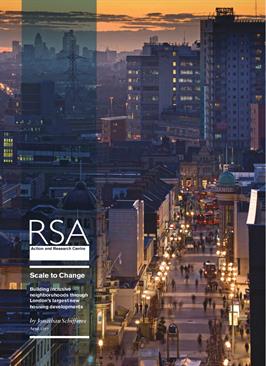Large-scale developments are a vital response to London’s housing challenge. It is crucial that we build inclusive and welcoming communities – however there is a risk that policy intended to provide housing for a range of incomes inadvertently leads to segregated and polarised new neighbourhoods. People on average incomes often can’t access or afford homes under any of the tenures offered by new development.
We suggest that developers could benefit from providing a broader range of tenures than policy stipulates. A more diverse range of tenures can help to ensure residents can remain local as their housing needs change over time. Strong social networks are key features of attractive places, driving long-term economic and social value.
Our report, Scale to Change, seeks to explore the unique challenges and opportunities of large scale developments – in relation not just to the design and allocation of housing, but wider elements of place-making too. With developers increasingly in the driving seat, we outline steps that developers can take – not only in response to public expectations but as a driver of financial value. Great neighbourhoods are more valuable.
Developers shouldn’t only focus on the housing mix; they should also consider how people mix. Investment in social infrastructure and civic institutions that facilitate social mixing – schools and open spaces in particular – is critical to generate interaction and shared identity in a neighbourhood. There is an economic imperative too: London’s dynamic economy relies on its workforce being able to find homes people can afford in neighbourhoods that provide a decent quality of life.
We owe it to future generations of Londoners to deliver not just new homes at scale, but also to change the nature of large-scale development so as to build socially inclusive neighbourhoods.
pdf 1.1 MB
Contributors

Related reports
-
Co-living and the common good
In this collection of essays, we ask a number of thought leaders and practitioners to explore the potential of alternative housing models such as co-living to help meet the challenges of today, with a particular focus on cities and urban areas.
-
5 ways housing associations underpin inclusive growth
The RSA Inclusive Growth Commission hosted the last of it’s seven seminars in February, 2017, exploring the existing role housing associations play in underpinning inclusive growth and what an enhanced role for housing providers might look like.


